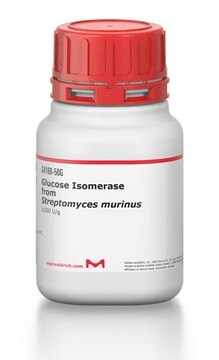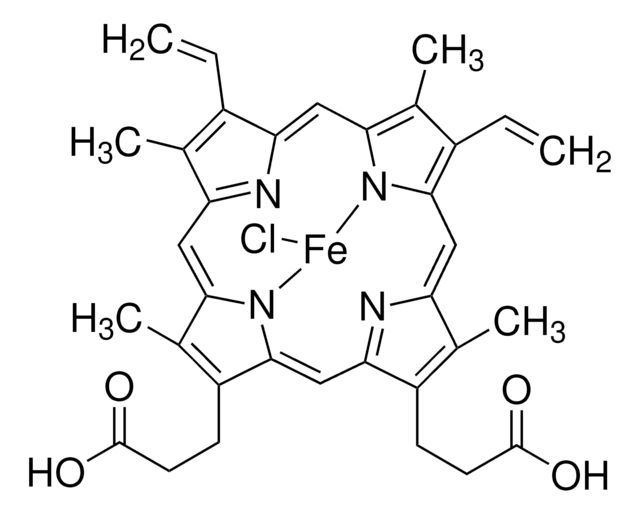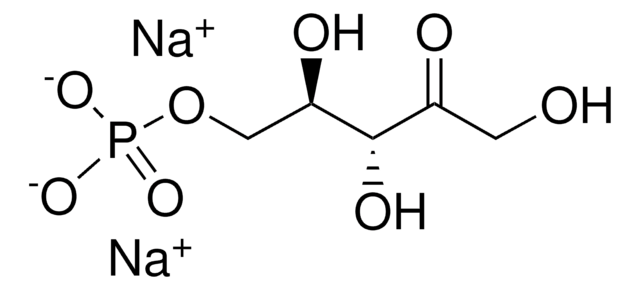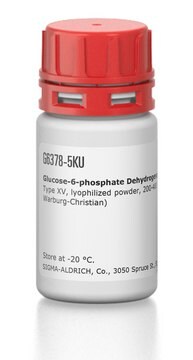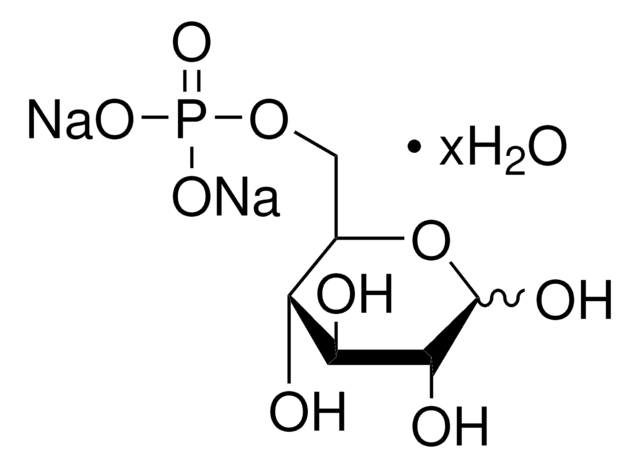SAE0005
Glucose-6-phosphate Isomerase human
recombinant, expressed in E. coli
Synonyme(s) :
GPI, PGI
Se connecterpour consulter vos tarifs contractuels et ceux de votre entreprise/organisme
About This Item
Produits recommandés
Produit recombinant
expressed in E. coli
Niveau de qualité
Essai
≥95% (SDS-PAGE)
Activité spécifique
≥200 units/mg protein
Température de stockage
−20°C
Actions biochimiques/physiologiques
Glucose-6-phosphate isomerase (GPI) is a homodimeric enzyme ubiquitously present in most organisms. GPI catalyzes the interconversion between glucose-6-phosphate and fructose-6-hosphate, the second step of the glycolytic pathway. In mammals, Glucose-6-phosphate isomerase also acts as an autocrine motility factor (AMF), a neuroleukin, and a maturation factor. GPI deficiency is the second most common erythroenzymopathy of glycolytic enzymes after pyruvate kinase deficiency. Inherited deficiency of the enzymatic activity of GPI causes hereditary nonspherocytic hemolytic anemia (HNSHA) in humans, a severe deficiency that can be associated with hydrops fetalis (a-thalassaemia), immediate neonatal death, and neurological impairment.
Propriétés physiques
C-terminal histidine-tagged
Définition de l'unité
One unit will convert 1.0 mmole of D-fructose 6-phosphate to D-glucose 6-phosphate per inute at pH 7.4 at 25 °C.
Forme physique
Supplied as a solution in 50 mM Tris-HCl pH 7.5, and 50% glycerol
Code de la classe de stockage
10 - Combustible liquids
Classe de danger pour l'eau (WGK)
WGK 1
Point d'éclair (°F)
Not applicable
Point d'éclair (°C)
Not applicable
Faites votre choix parmi les versions les plus récentes :
Certificats d'analyse (COA)
Lot/Batch Number
Vous ne trouvez pas la bonne version ?
Si vous avez besoin d'une version particulière, vous pouvez rechercher un certificat spécifique par le numéro de lot.
Déjà en possession de ce produit ?
Retrouvez la documentation relative aux produits que vous avez récemment achetés dans la Bibliothèque de documents.
Miao Xu et al.
Blood, 132(6), 622-634 (2018-05-26)
Thrombopoietin (TPO), a hematopoietic growth factor produced predominantly by the liver, is essential for thrombopoiesis. Prevailing theory posits that circulating TPO levels are maintained through its clearance by platelets and megakaryocytes via surface c-Mpl receptor internalization. Interestingly, we found a
Jose Maria Bastida et al.
Thrombosis and haemostasis, 117(1), 66-74 (2016-10-14)
Currently, molecular diagnosis of haemophilia A and B (HA and HB) highlights the excess risk-inhibitor development associated with specific mutations, and enables carrier testing of female relatives and prenatal or preimplantation genetic diagnosis. Molecular testing for HA also helps distinguish
Alice Fabarius et al.
Cancers, 14(12) (2022-06-25)
Soluble factors released from irradiated human mesenchymal stromal cells (MSC) may induce genetic instability in human CD34+ cells, potentially mediating hematologic disorders. Recently, we identified four key proteins in the secretome of X-ray-irradiated MSC, among them three endoplasmic reticulum proteins
Lee-Chun Su et al.
ACS nano, 8(10), 10826-10836 (2014-09-16)
The endothelium monolayer lining in the luminal side of blood vessels provides critical antithrombotic functions. Damage to these cells will expose a highly thrombogenic subendothelium, which leads to pathological vascular changes. Using combined tissue engineering and ligand-receptor targeting strategy, we
Yunmei Wang et al.
Nature communications, 8, 15559-15559 (2017-05-31)
Inflammation and thrombosis occur together in many diseases. The leukocyte integrin Mac-1 (also known as integrin α
Notre équipe de scientifiques dispose d'une expérience dans tous les secteurs de la recherche, notamment en sciences de la vie, science des matériaux, synthèse chimique, chromatographie, analyse et dans de nombreux autres domaines..
Contacter notre Service technique